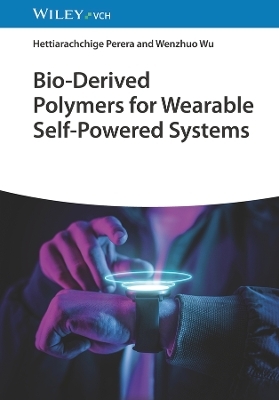
Bio-Derived Polymers for Wearable Self-PoweredSystems
Blackwell Verlag GmbH
978-3-527-35004-9 (ISBN)
Bio-Derived Polymers for Wearable Self-Powered Systems explores the use of bio-derived polymers in wearable self-powered human-integrated sensors and covers core properties of bio-derived polymers in a broad sense, including their properties and methods of manufacture. Overall, the work provides a comprehensive and complete overview of these materials, which will be highly beneficial for the scientific community in developing eco-friendly self-powered systems in the near future.
Written by two research specialists in the field, Bio-Derived Polymers for Wearable Self-Powered Systems covers sample topics such as:
The main types of bio-derived polymers and their applications in wearable self-powered devices
Electrical and mechanical properties of bio-derived polymers, both of which are of prime concern when developing wearable or implantable biomedical devices
Physiological sensing applications of triboelectric nanogenerators and piezoelectric nanogenerators
New strategies and methodologies for biomedical engineers to develop self-powered wearable health monitoring devices for real-time applications
For chemists, scientists, and engineers in fields intersecting with sensor development, Bio-Derived Polymers for Wearable Self-Powered Systems provides an essential overview of the advances in bio-derived polymer-based devices and fuels further research by imparting many interesting new research opportunities.
Wenzhuo Wu is the Ravi and Eleanor Talwar Rising Star Associate Professor in the School of Industrial Engineering at Purdue University. He received his Ph.D. from Georgia Tech in Materials Science and Engineering in 2013. Dr. Wu’s research interests focus on innovating unprecedented material technologies for next-generation products through nanomanufacturing across length scales. Hettiarachchige Perera received his Bachelor degree from Purdue University and is currently a Ph.D. student in Prof. Wenzhuo Wu's group. His research focuses on advanced nanomanufacturing of human-integrated energy harvesting devices.
Chapter 1 Overview of bio-derived polymer in electronics
1.1 Introduction
1.2 Self-powered sensors/systems
1.3 Bio-derived polymer and its composites
1.4 About this book
Chapter 2 Basis of bio-derived polymer for wearable devices
2.1 Mechanical performance of bio-derived polymer for wearable devices
2.2 Electrical performance of bio-derived polymer for electronics
2.3 Biocompatibility
2.4 Summary
Chapter 3 Chitosan
3.1 Extraction and processability
3.2 Chemistry of chitosan (functionalization/modification)
3.3 Applications (specific component in device based on materials properties, brief introduction)
Chapter 4 Cellulose
4.1 Extraction and processability
4.2 Chemistry of cellulose
4.3 Applications
Chapter 5 Starch
5.1 Extraction and processability
5.2 Chemistry of starch
5.3 Applications
Chapter 6 Alginate
6.1 Extraction and processability
6.2 Chemistry of alginate
6.3 Applications
Chapter 7 Lignin
7.1 Extraction and processability
7.2 Chemistry of lignin
7.3 Applications
Chapter 8 Proteins
8.1 Silk
8.1.1 Extraction and processability
8.1.2 Chemistry of silk
8.1.3 Applications
8.2 Gelatin
8.2.1 Extraction and processability
8.2.2 Chemistry of gelatin
8.2.3 Applications
Chapter 9 Mechanical energy harvesting based on bio-derived materials
9.1 TENG
9.2 PENG
Chapter 10 Thermal energy harvesting based on bio-derived materials
Chapter 11 Biochemical energy harvesting based on bio-derived materials
Chapter 12 Wearable sensors based on bio-derived materials
12.1. Mechanical sensors
12.2 Sensors for monitoring physiological signal
12.3 Gas sensors
12.4 Bio-derived polymer as green binders for electrochemical devices
Chapter 13 Conclusions
13.1 At the level of bio-derived polymer
13.2 At the level of devices
13.3 At the level of systems
| Erscheinungsdatum | 16.05.2024 |
|---|---|
| Verlagsort | Berlin |
| Sprache | englisch |
| Maße | 170 x 244 mm |
| Themenwelt | Naturwissenschaften ► Chemie ► Organische Chemie |
| Technik ► Elektrotechnik / Energietechnik | |
| ISBN-10 | 3-527-35004-7 / 3527350047 |
| ISBN-13 | 978-3-527-35004-9 / 9783527350049 |
| Zustand | Neuware |
| Informationen gemäß Produktsicherheitsverordnung (GPSR) | |
| Haben Sie eine Frage zum Produkt? |
aus dem Bereich


